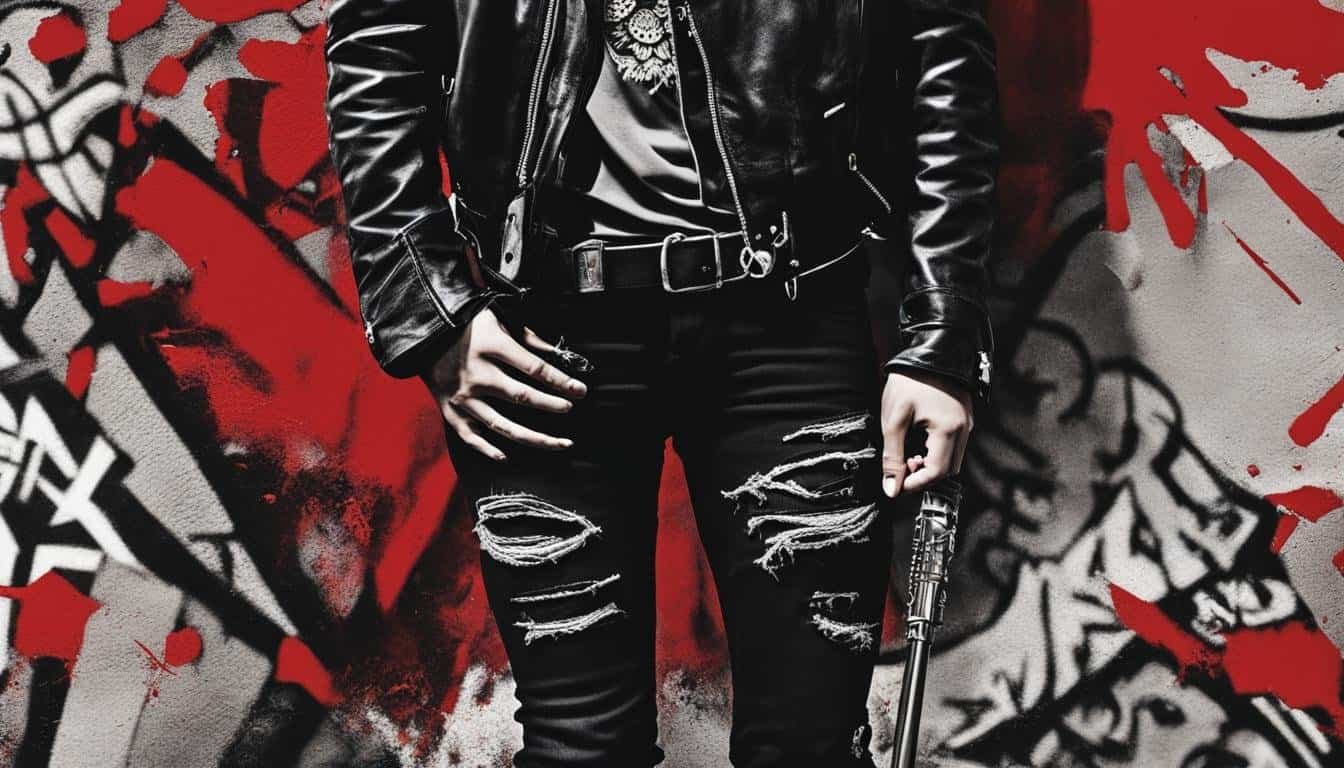What is The Rebel archetype?
|
Getting your Trinity Audio player ready...
|
The Rebel archetype is a powerful and captivating force that embraces nonconformity, independence, and revolutionary thinking. Rebels challenge the status quo, disrupt industries, and have the potential to change the world. From rebellious artists to social activists, the rebel personality traits and characteristics can be found across various domains, showcasing the enduring appeal of this archetype.
The symbolic representation of rebellion can be observed in culture, literature, and history, highlighting its deep-rooted significance. Embracing rebellion allows individuals and brands to stand out, presenting themselves as agents of change committed to forging a better future.
Key Takeaways:
- The Rebel archetype embodies nonconformity, independence, and revolution.
- Rebels challenge societal norms and disrupt industries.
- Embracing rebellion allows for differentiation and standing out.
- Rebel symbolism can be found in culture, literature, and history.
- Rebels have the potential to inspire and effect meaningful change.
Rebels as Pioneers
Rebels are not just rule-breakers; they are trailblazers. They embody the spirit of change and innovation, challenging societal norms and disrupting industries. These pioneers have the potential to change the world and inspire others to follow in their footsteps.
They represent change, innovation, and disruption.
Rebels are driven by a deep desire to challenge the status quo and create a better future. They see possibilities where others see limitations, pushing boundaries and exploring uncharted territories. These pioneers fearlessly embrace the unknown, paving the way for new ideas, technologies, and ways of thinking.
They inspire us to question the established norms and reimagine what is possible.
Throughout history, rebels have sparked revolutions and movements that have reshaped societies. Think of figures like Rosa Parks, who defied segregation laws and ignited the civil rights movement, or Steve Jobs, who revolutionized the technology industry with his innovative ideas and relentless pursuit of excellence.
“Here’s to the crazy ones. The misfits. The rebels. The troublemakers. The round pegs in the square holes. The ones who see things differently. They’re not fond of rules, and they have no respect for the status quo. You can quote them, disagree with them, glorify or vilify them. But the only thing you can’t do is ignore them. Because they change things. They push the human race forward. And while some may see them as the crazy ones, we see genius. Because the people who are crazy enough to think they can change the world are the ones who do.” – Steve Jobs
Rebels challenge conventional wisdom and inspire us to think outside the box, encouraging creativity and innovation. They remind us that progress is often born out of discomfort and a willingness to take risks.
They are the catalysts for transformation and the driving force behind societal evolution.
The Rebel Archetype in Branding
Brands that embrace the Rebel archetype have the power to make a lasting impact in the market. By positioning themselves as agents of change and challenging the status quo, these brands develop a strong emotional connection with consumers. The Rebel archetype allows brands to tap into the innate human desire for rebellion and individuality, making them stand out from their competitors.
One of the key aspects for brands adopting the Rebel archetype is authenticity. Consumers can easily detect inconsistencies in messaging or values, and if a brand fails to deliver on its promise of rebellion, it risks losing credibility. Authenticity requires a deep understanding of the brand’s core values and a consistent portrayal of those values throughout all marketing efforts.
When brands successfully embody the Rebel archetype, they become a symbol of rebellion and empowerment. They inspire consumers to break free from societal norms and challenge the status quo. These brands create a sense of belonging and community among their supporters, who align themselves with the rebel mindset.
One way brands can leverage the Rebel archetype in their branding is by using powerful imagery and messaging. Bold and provocative visuals, combined with strong and edgy language, can leave a lasting impression on consumers and reinforce the rebellious nature of the brand. This approach helps create a brand identity that is distinct and memorable, ensuring the brand remains top of mind for its target audience.
“In marketing, the Rebel archetype provides brands with the opportunity to challenge the traditional norms and disrupt the industry. By embracing rebellion, brands can forge a unique identity that resonates deeply with consumers.”
Moreover, brands can create a sense of exclusivity and scarcity by positioning themselves as rebels. This can be achieved through limited edition products, exclusive events, or by partnering with unconventional influencers who embody the Rebel archetype. By associating themselves with rebellious individuals or concepts, brands can further strengthen their connection with their target audience.
To summarize, the Rebel archetype in branding offers brands the chance to stand out and connect with consumers on a deeper level. By embracing rebellion and authenticity, brands can cement their position as agents of change and foster a loyal community of supporters. However, it is essential for brands to carefully manage their messaging and ensure that it aligns with their values to maintain credibility and resonate with the right audience.
Importance of Authenticity for Rebel Brands
Authenticity is a key aspect for Rebel brands. In order to establish a strong connection with consumers, these brands must ensure transparency and authenticity in their messaging and actions. Any inconsistencies in their values or communication can damage their credibility and erode the trust of their audience.
Rebel brands are known for challenging the status quo and breaking barriers. They stand out by presenting themselves as agents of change and daring to question established norms. This rebellious nature resonates deeply with consumers who are seeking authenticity and a brand that aligns with their values.
“To be authentic, we must embrace our true selves and not be afraid to go against the grain. Only then can we inspire others to do the same.”
By embodying the Rebel archetype, brands have the power to create a unique identity in the market. However, this identity can only be sustained through genuine authenticity. Consumers are quick to detect superficial attempts at rebellion, and brands that fail to deliver on their promises may face backlash and lose their loyal following.
Building Trust Through Authenticity
At the core of the Rebel archetype is the belief in making a meaningful impact and driving change. To achieve this, brands must not only communicate their rebellious spirit but also back it up with actions. Authenticity is the foundation upon which trust is built, and trust is a vital currency in today’s consumer landscape.
- Transparency: Rebel brands should be open and transparent about their values, mission, and business practices. This includes being upfront about their shortcomings and demonstrating a commitment to improvement.
- Consistency: It is essential for Rebel brands to align their messaging across all channels. This consistency helps to create a coherent story that resonates with their target audience and reinforces their authenticity.
- Honesty: Rebel brands should not shy away from addressing controversial topics or sharing their honest opinions. Authenticity requires brands to be true to themselves, even if it means taking a stance that might not be universally popular.
- Customer-Centricity: Rebel brands need to prioritize their customers’ needs and aspirations. By placing the consumer at the center of their strategies, these brands demonstrate a genuine commitment to their audience and earn their trust in return.
Successfully navigating the Rebel archetype requires a deep understanding of the brand’s values and purpose. Rebel brands that champion authenticity can forge genuine connections with their audience and create a loyal following that shares their rebellious spirit.
Challenges for Rebel Brands
Embracing the Rebel archetype can be both exhilarating and daunting for brands. While it allows them to stand out from the crowd and create a unique identity, it also presents its own set of challenges. Rebel brands must overcome these obstacles to maintain their authenticity and resonate with their target audience.
Alienating Broader Markets
Rebel brands often cater to niche markets or specific demographics who embrace their nonconformity. However, this exclusivity can sometimes alienate broader markets. It is crucial for rebel brands to strike a balance between staying true to their core identity and attracting a wider consumer base. By carefully crafting their messaging and positioning, rebel brands can expand their reach without compromising their rebellious edge.
Negative Perception
Rebel brands may encounter negative perceptions from those who view them as promoting conflict, disobedience, or disruption. It is essential for these brands to communicate their values, purpose, and positive impact to counteract any negative preconceptions. Through transparent communication and showcasing their commitment to social responsibility, rebel brands can shift the narrative and gain the trust of their audience.
“It’s not that rebels don’t care about rules; it’s just that they care more about the change they can bring.”
Losing Control of the Narrative
Rebel brands thrive on challenging the status quo and pushing boundaries. However, this can sometimes lead to a loss of control over the narrative surrounding their brand. The public may interpret their messaging differently or the brand may become overshadowed by controversial conversations. To mitigate this risk, rebel brands must consistently reinforce their core values and purpose, ensuring that their messaging remains clear, focused, and aligned with their brand story.
To navigate these challenges successfully, rebel brands must remain agile, adaptable, and true to their rebellious nature. By embracing these hurdles as opportunities for growth and staying authentic, rebel brands can carve their own path to success.
| Challenges | Impact | Strategies |
|---|---|---|
| Alienating broader markets | Reduced potential customer base, limited growth | Targeted marketing, strategic partnerships, expanding value proposition |
| Negative perception | Damage to brand reputation, reduced trust | Educational campaigns, clear communication, showcasing positive impact |
| Losing control of the narrative | Diluted messaging, misalignment with brand values | Consistent storytelling, reinforcing brand purpose, proactive engagement |
Defining Brand Identity with the Rebel Archetype
The Rebel archetype offers brands a powerful tool to establish a strong and unique identity. By deeply understanding and aligning with their core values, brands can create impactful campaigns that emotionally resonate with their audience.
Embracing the Rebel archetype allows brands to differentiate themselves in a competitive market.
Brands that embody the Rebel archetype challenge the status quo and disrupt conventional norms. They inspire others to question the existing order and embrace change. By presenting themselves as agents of change, these brands appeal to consumers who share their sense of nonconformity and rebellion.
“In a world that so often asks us to fall in line, rebel brands offer us hope and inspiration. They remind us that we have the power to challenge the existing system and shape a better future.”
When defining brand identity through the Rebel archetype, authenticity is paramount. Brands must ensure that their messaging, values, and actions are consistent and aligned with their rebellious spirit. Any inconsistencies can undermine the brand’s credibility and authenticity, leading to a loss of trust among consumers.
Creating Emotionally Resonant Campaigns
Brands that embrace the Rebel archetype have the opportunity to create campaigns that deeply resonate with their target audience. These campaigns evoke emotions, inspire action, and encourage consumers to join the rebellion.
When crafting campaigns, brands should tap into the core values and aspirations of their rebel audience. The messaging should convey a clear sense of purpose, empowering consumers to break free from constraints and embrace their own rebellious nature.
Rebel brands often use provocative and unconventional imagery to capture attention and establish a rebellious identity.
For instance, Diesel, the Italian clothing brand, is known for its rebellious spirit and provocative campaigns. One of their iconic campaigns featured the tagline, “Be Stupid,” encouraging consumers to embrace their unique perspectives and defy societal norms.
The Impact of the Rebel Archetype
Brands that successfully define their identity through the Rebel archetype can benefit from several advantages:
- Stand out in a crowded marketplace
- Create an emotional connection with their target audience
- Be perceived as bold and innovative
- Inspire customer loyalty and advocacy
The Rebel archetype gives brands the opportunity to challenge the status quo, disrupt traditional narratives, and redefine industry standards.
| Advantages of the Rebel Archetype | Examples |
|---|---|
| 1. Differentiation in the Market | Warby Parker challenged the eyewear industry by offering affordable stylish glasses and disrupting the traditional retail model. |
| 2. Emotional Connection | Red Bull has established a strong connection with their target audience by associating their brand with extreme sports and pushing boundaries. |
| 3. Bold and Innovative Image | Tesla disrupted the automotive industry by introducing electric vehicles, emphasizing sustainability and innovation. |
| 4. Customer Loyalty and Advocacy | Patagonia has built a dedicated community of customers who align with their values of environmental conservation and social responsibility. |
By defining their brand identity with the Rebel archetype, brands can unlock their true potential, disrupt industries, and create a lasting impact on their audiences.
Integration of Rebel Archetype in Marketing and PR
To leverage the power of the Rebel archetype effectively, brands need to seamlessly integrate it into their marketing and public relations strategies. This involves adopting a consistent and creative approach across all channels, ensuring that the messaging aligns with the key traits of the Rebel archetype and resonates positively with the target audience.
The Rebel archetype represents nonconformity, independence, and rebellion. Brands that successfully integrate this archetype into their marketing and PR initiatives have the opportunity to create a strong and memorable presence in the market.
By embracing the Rebel archetype, brands can position themselves as agents of change and challenge the status quo. They can redefine industry norms, challenge societal conventions, and stand out from the competition. This rebellious approach captures the attention and interest of consumers who are looking for something different and innovative.
“Our brand rebels against the outdated norms of society, sparking a revolution in the industry. We empower individuals to embrace their rebellious spirit and create a better future.”
Embracing the Rebel archetype in marketing and PR allows brands to connect emotionally with their target audience. By using storytelling techniques, captivating visuals, and engaging content, these brands can create a deep emotional connection and inspire a sense of rebellion in their consumers.
For example:
- A rebellious apparel brand could use provocative images and thought-provoking messages in their advertising campaigns to challenge societal expectations of beauty and fashion.
- A disruptive technology company could utilize bold and unconventional PR stunts to generate buzz and position themselves as industry innovators.
By incorporating the Rebel archetype, brands can effectively differentiate themselves from competitors and create a brand identity that stands out.
Benefits of Integrating the Rebel Archetype
When brands integrate the Rebel archetype into their marketing and PR strategies, several benefits can be realized:
- Unique positioning: The Rebel archetype allows brands to carve out a distinct position in the market by challenging industry norms and offering alternative solutions.
- Memorable brand identity: Brands that embrace the Rebel archetype often leave a lasting impression on consumers, who admire their rebellious spirit and unconventional approach.
- Emotional connection: By tapping into the Rebel archetype, brands can forge deep emotional connections with their target audience, inspiring them to align with the brand’s values and purpose.
- Inspiring action: Rebel archetype brands have the power to inspire and motivate consumers to take action, whether it’s making a purchase, advocating for change, or joining a movement.
By effectively integrating the Rebel archetype into their marketing and PR strategies, brands can create a strong and impactful presence that resonates with their target audience.
| Brands | Industry | Key Rebel Traits |
|---|---|---|
| Patagonia | Outdoor Apparel | Sustainability, Environmental Activism |
| Tesla | Electric Vehicles | Disruption, Innovation |
| Ben & Jerry’s | Ice Cream | Social Activism, Progressive Values |
Examples of Rebel Archetype Brands
When it comes to brands that embody the Rebel archetype, two notable examples stand out: Mountain Dew and PayPal.
Mountain Dew, with its bold and daring marketing campaigns, positions itself as a drink for nonconformists. The brand appeals to individuals who embrace rebellion, adventure, and the pursuit of excitement. Mountain Dew’s advertisements often feature extreme sports, youth culture, and unconventional storytelling, all in line with the Rebel archetype.
PayPal disrupted the traditional payment industry when it emerged as a digital alternative to traditional banking methods. By challenging the status quo and offering a convenient and alternative option for online transactions, PayPal quickly became synonymous with rebellion in the finance world. The brand now enjoys widespread use and recognition, catering to a generation that prioritizes convenience and digital innovation.
These brands not only challenge societal norms but also provide alternative solutions that resonate with their target audience. They exemplify the power of the Rebel archetype in capturing attention, driving change, and appealing to consumers who seek out unconventional options.
Potential Challenges and Risks for Rebel Archetype Brands
While embracing the Rebel archetype can bring numerous benefits to brands, it also presents challenges and risks that need careful consideration. Rebel archetype brands may face the following challenges:
1. Alienating Broader Markets
Rebel archetype brands often have a unique and unconventional approach that may not resonate with a wider audience. By challenging traditional norms and expectations, these brands risk alienating more conservative consumers who prefer conformity. It is essential for rebel brands to strike a balance between staying true to their rebellious nature and appealing to a broader market segment.
2. Portraying a Negative Image
If rebel archetype brands are not presented and managed correctly, they may be perceived as promoting negative behavior or inciting rebellion for its own sake. This perception can be detrimental to the brand’s reputation and relationships with stakeholders. It is crucial for rebel brands to communicate their values and intentions clearly, emphasizing positive changes and societal benefits rather than simply being rebellious for the sake of it.
3. Losing Control of the Narrative
When brands embrace rebellion and challenge the status quo, they run the risk of losing control over how their message is interpreted and shared. The public’s perception and response are beyond the brand’s direct control, and negative interpretations or misrepresentations can harm the brand’s image. Rebel archetype brands must carefully craft their messaging and engage in robust reputation management to mitigate the risk of losing control of the narrative.
To effectively navigate these challenges and mitigate the associated risks, rebel archetype brands must prioritize authenticity, consistent messaging, and a deep understanding of their target audience. By aligning their values with their marketing strategies and maintaining a transparent and authentic brand identity, rebel brands can overcome these challenges and build strong connections with their audience.
Comparing Challenges and Risks for Rebel Archetype Brands
| Challenges | Risks |
|---|---|
| Alienating broader markets | Loss of potential customers and market share |
| Portraying a negative image | Damaged reputation and relationships with stakeholders |
| Losing control of the narrative | Misinterpretation and negative public perception |
Successfully managing these challenges and risks allows rebel archetype brands to stand out, differentiate themselves in the market, and capture the attention of their target audience while maintaining authenticity.
Conclusion
The Rebel archetype offers brands a powerful opportunity to differentiate themselves, foster emotional connections with their audience, and establish a unique brand identity. By embracing the core traits and characteristics of the Rebel archetype, brands can inspire and motivate their target audience to question societal norms and pursue positive change.
However, it is crucial for brands to navigate the challenges and risks associated with the Rebel archetype. The risk of alienating broader markets, portraying a negative image, and losing control of the narrative necessitates careful messaging and strategic brand management. Maintaining authenticity and aligning values across all touchpoints is paramount to building trust with consumers.
In conclusion, the Rebel archetype holds great potential for brands seeking to make a lasting impact. By leveraging its disruptive and nonconformist qualities, brands can differentiate themselves in a crowded market, resonate with their target audience, and pave the way for positive change. By carefully managing the challenges and risks, brands can effectively utilize the Rebel archetype to establish a strong brand identity that connects deeply with consumers.







